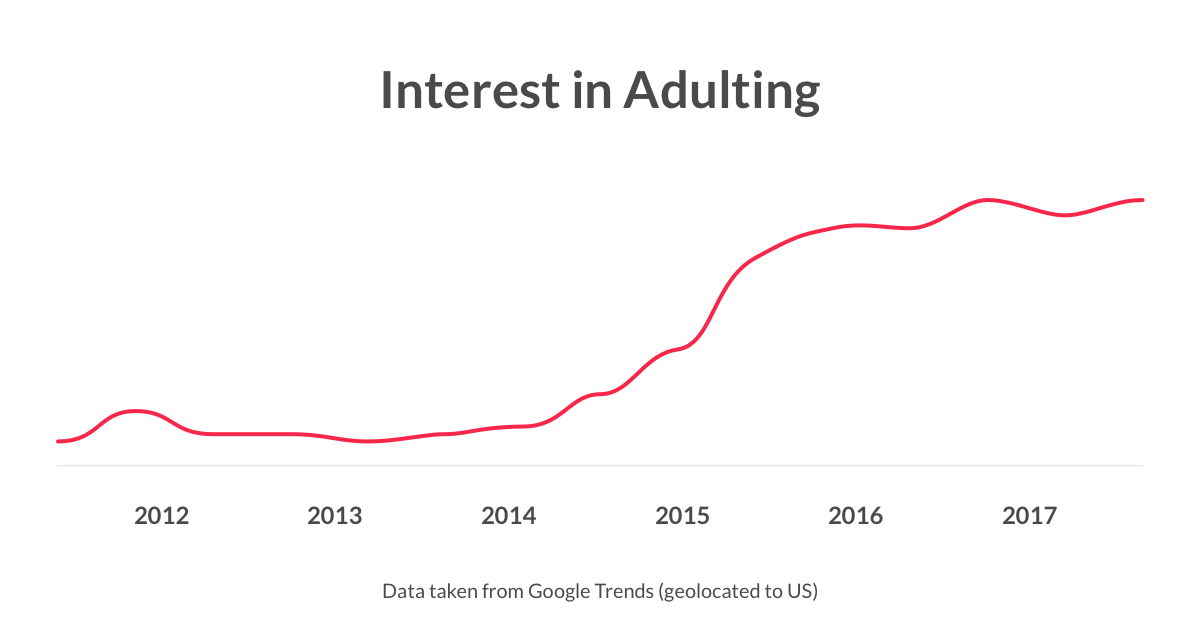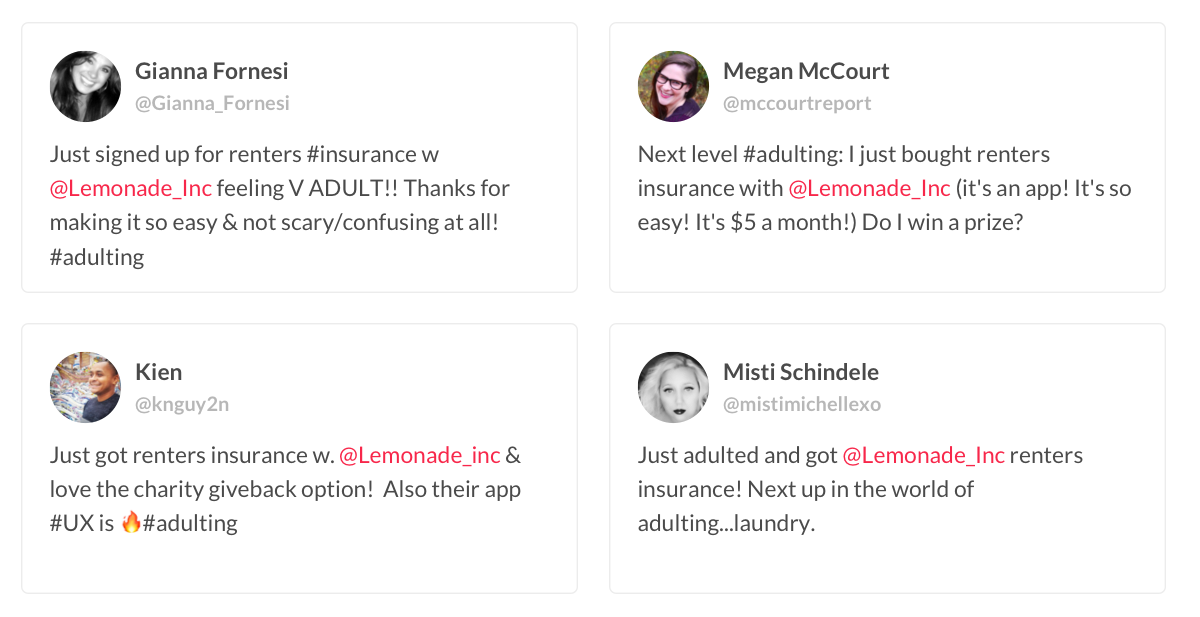“Adulting is hard.” How many times have you read that sentence on your social feed? Sentiments about adulting are everywhere, from hilarious memes to resentful tweets.
It’s pretty incredible that this noun-turned-verb has picked up such speed in recent years: ‘Adulting’ was Oxford Dictionary’s Word of the Year in 2016, and Google searches for ‘adulting’ have increased dramatically.
As a word so many people identify with, ‘adulting’ sparks curiosity. Here at Lemonade, we were wondering: Does this word’s popularity signify a meaningless trend, or a deeper shift of our societal norms?

We decided to investigate.
Millennials aren’t the only ones
Turns out, several sociologists and psychologists have also noticed a shift among millennials in their 20s.
Sociologist Kathleen Shaputis labels millennials the ‘Peter Pan Generation,’ because they’re delaying growing up. Many sociologists don’t consider people in their 20s to be ‘adolescents,’ but calling them ‘adults’ just no longer seems right. So they’ve given our 20s a new name: ‘emerging adulthood.’
Emerging adulthood is “a period of development bridging adolescence and young adulthood, during which young people are no longer adolescents but have not yet attained full adult status,” according to Professor Jeff Arnett. This period usually spans from ages 18-25, but can last up to age 29.
Turns out ‘emerging adulthood’ is how sociologists define ‘adulting.’
Since millennials and academics alike are coining new terms for this in-between stage, something must be at play here. People in their 20s have fit into the ‘adult’ category for every generation up until now.
“We’re in the thick of what one sociologist calls “the changing timetable for adulthood,’” wrote New York Times journalist Robin Henig.
Whoa, that’s a big statement. Let’s put on our sociologist caps and look at the data.
Diving deep
It seems millennials are leaning on their parents much more than previous generations did. Nearly one in three millennials are living with mom and dad – it’s become the most common living situation among this age group, according to the US Census Bureau. Not only that, but millennials are also three times more likely to get financial help from their parents than in the past, according to USA Today.
There are a combination of factors contributing to this trend: the 2008 recession, increasing debt, the rise of helicopter parenting, and rising housing costs, among others.
These rising socioeconomic trends lead not only to a change in lifestyle, but also a change in mindset.
If your parents cook, clean, or run errands for you – or pay for you to do so – it’s difficult to feel like a completely independent adult, and to learn how to budget effectively.
To top it off, millennials tend to have a different attitude towards financial stability when it comes to relationships: Nearly three in four believe that financial security should come before marriage, while only 55% of older Americans felt similarly, according to The Atlantic. Their uncertain financial status, coupled with this new attitude, can only mean one thing: putting marriage off.
The numbers speak for themselves. In 1960, the median marriage age was 20 for women and 23 for men. Now, it’s 27 for women and 29 for men, and is still rising. (The Atlantic)
Btw, this isn’t only because of millennials’ economic prospects – it’s also due several societal changes that happened around the same time, such as:
- The need for more higher education due to the information economy
- The rise of premarital sex, cohabitation, and birth control
- The fact that young women are feeling less rushed to have kids, given their wide range of career options and access to birth control
A changing mindset
In short, millennials are delaying traditional milestones of adulthood more and more. This does more than just alter their lifestyle – it impacts the way they see the world, according to our Chief Behavioral Officer Dan Ariely.
“When you’re a kid, your mind is trained to think only one day at a time. As you get older, you have to change your mindset and think more long term. It’s becoming more difficult for young adults to think about prioritizing their future selves, since they’re not reaching the milestones that typically force them to do so, such as getting married and having kids. Now, we have teenage years, take 2.”
There we have it. Due to these societal shifts, people in their 20s don’t feel like real adults because they haven’t reached traditional milestones. Therefore, they don’t often associate themselves with the noun ‘adult’ just yet. But sometimes, they’re forced to behave as adults – that’s where the verb ‘adulting’ comes in.
People in their 20s have to do adult-like actions sometimes, but aren’t used to doing them all the time. According to a topic model analysis by Megan Risdal, when people tweet about ‘adulting’ on Twitter, they most often refer to temporary actions that make them feel like adults, such as paying down loans, signing a lease for their first apartment, and figuring out taxes. When they temporarily do these adult activities, they often feel younger than their actions.
The bottom line
So why is adulting trending? Because so many millennials relate to this feeling of temporarily acting as adults, but not feeling like a complete adult.
But it’s pretty clear that the rise of the word ‘adulting’ is more than just a temporary fad – this phenomenon doesn’t look like it’s going away anytime soon. The average age of marriage is still on the rise, and it’s becoming more socially acceptable to stay in your parents’ home past college.
It’s no coincidence that fintech is on the rise – it’s an industry full of emerging startups trying to make these intimidating ‘adulting’ actions easier. For almost any scary adulting action, there’s an app.
It’s no wonder that here at Lemonade, our social feed is no different from the rest. When our Lemonade members tweet about getting a policy, many of them also associate it with ‘adulting.’

Here’s to embracing this new reality, and creating systems and apps to help millennials navigate this scary (but exciting) stage of life.
Pro tip: Adult in 90 secs. Get a contents insurance policy with Lemonade.



